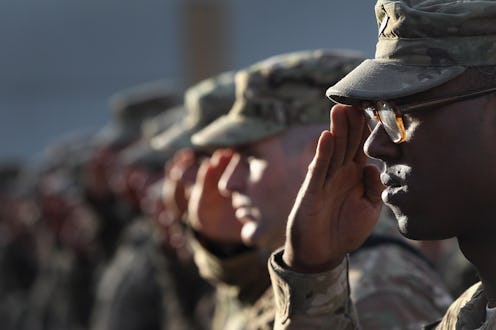News
7 Arguments You Might Hear About The Trans Military Ban & How To Shut Them Down

So you're at a party, and someone says something ignorant. And while you know that they're in the wrong, and that you could totally engage them and win if you were a bit more prepared, your words escape you. To make sure that doesn't happen, we've compiled a series of handy reference guides with the most common arguments — and your counter-arguments — for all of the hot-button issues of the day. This week's topic: How to argue against Trump's transgender military ban.
Common Argument #1: Military matters shouldn't be politicized.
Your response: Apparently, that's not how Trump sees it. Setting aside the fact that adding gender orientation-based discrimination to existing military policy is an inherently political act, Trump reportedly banned transgender people from the military for a reason that had nothing to do with the military.
According to a report from POLITICO, Trump made the sudden decision on banning transgender soldiers in order to placate hard-line House conservatives who could have held up funding for his pledge to construct a wall along America's southern border with Mexico.
In other words, Trump apparently decided to attack the service of thousands of men and women in uniform in the hopes of carrying one of his longtime, hyper-controversial pet projects across the finish line. Trans activists tell Bustle that in making this decision, Trump has used their lives as pawns in a political game.
Common Argument #2: Obama didn't even address this until his last year in office.
Your response: That doesn't work as an argument in favor of reinstating a discriminatory policy. At best, it's actually an argument that Obama waited longer to act on behalf of transgender soldiers than he should have. Also, you'd be hard-pressed to argue he didn't care about these sorts of issues ― he first ran for president in 2008 calling for an end to the military's ban on gay and lesbian soldiers serving openly, and regardless of how long it took, he did take action on transgender soldiers during the final year of his administration.
Trump has decided to undo that — he bears the full responsibility for that, and he also should shoulder the burden of arguing why he thinks this ban is the right thing to do.
Common Argument #3: There aren't even that many transgender soldiers, so this will barely have an impact.
Your Response: According to some estimates, there are more than 15,000 active transgender service members in the U.S. armed forces right now.
And regardless of whether you think that's a significant number of not ― there are slightly less than 1.5 million service members overall ― they matter. Their service is every bit as important and significant and deserving of respect as anyone else's. There is no difference between them.
Common Argument #4: Who wants to die in a war anyways? Trump is doing transgender people a favor.
Your response: If your stance is that the military is violent and dangerous and nobody should want to be a part of it, fair enough; clearly, that's not an opinion shared by the hundreds of thousands of Americans who've enlisted. And if you only find yourself making that argument when some marginalized group is being singled out, then it's not about anti-war or anti-militarist sentiment — it's just about discrimination.
Common Argument #5: Well, Trump is the commander-in-chief, so he has absolute authority on military matters.
Your response: That's not entirely true: there are some areas in which Congress wields power over military affairs, such as declaring war and revising the Uniform Code of Military Justice.
But regardless, even if you grant that Trump has the power to ban transgender Americans from serving their country on the battlefield, that doesn't make it the right thing to do. That's just appealing to authority ― in this case, the authority of a man who's never served in the military; who attacked a prisoner of war for being captured; called for the commission of war crimes, and referred to avoiding sexually transmitted diseases as his "personal Vietnam."
Common Argument #6: The military is about life and death and service, not catering to people's feelings.
Your Response: This is not about catering to people's feelings. It's about equal protection under the law, and the right of citizens to enlist in the military in order to protect people who are not in the military.
Transgender Americans are living, breathing human beings ― ones who live under heightened threat of hate crimes, violence, and suicide, thanks to a prevailing culture that often denies them their dignity and treats them in grotesquely inhumane ways. Kind of like what the president just did!
Common Argument #7: Having openly serving transgender service members might offend their fellow soldiers.
Your Response: Wait, I thought you said people's feelings didn't enter into this? The reality is that when a person joins the armed forces, they take an oath to defend and uphold the U.S. Constitution, and to defend the nation from harm. That doesn't mean individual soldiers who harbor some sort of hatred toward transgender people get to dictate who can and can't join, just like someone can't object to serving alongside a woman, or a black person, or a Muslim, or an atheist.
Signing up to join the armed forces — whatever you think of the specific nature of American militarism and the many wars its caused — is one of the most selfless, self-endangering acts a citizen can take in service of their nation. And the notion that transgender Americans willing to give up their lives in combat are being demeaned and dehumanized this way by their commander-in-chief is nothing short of disgraceful.